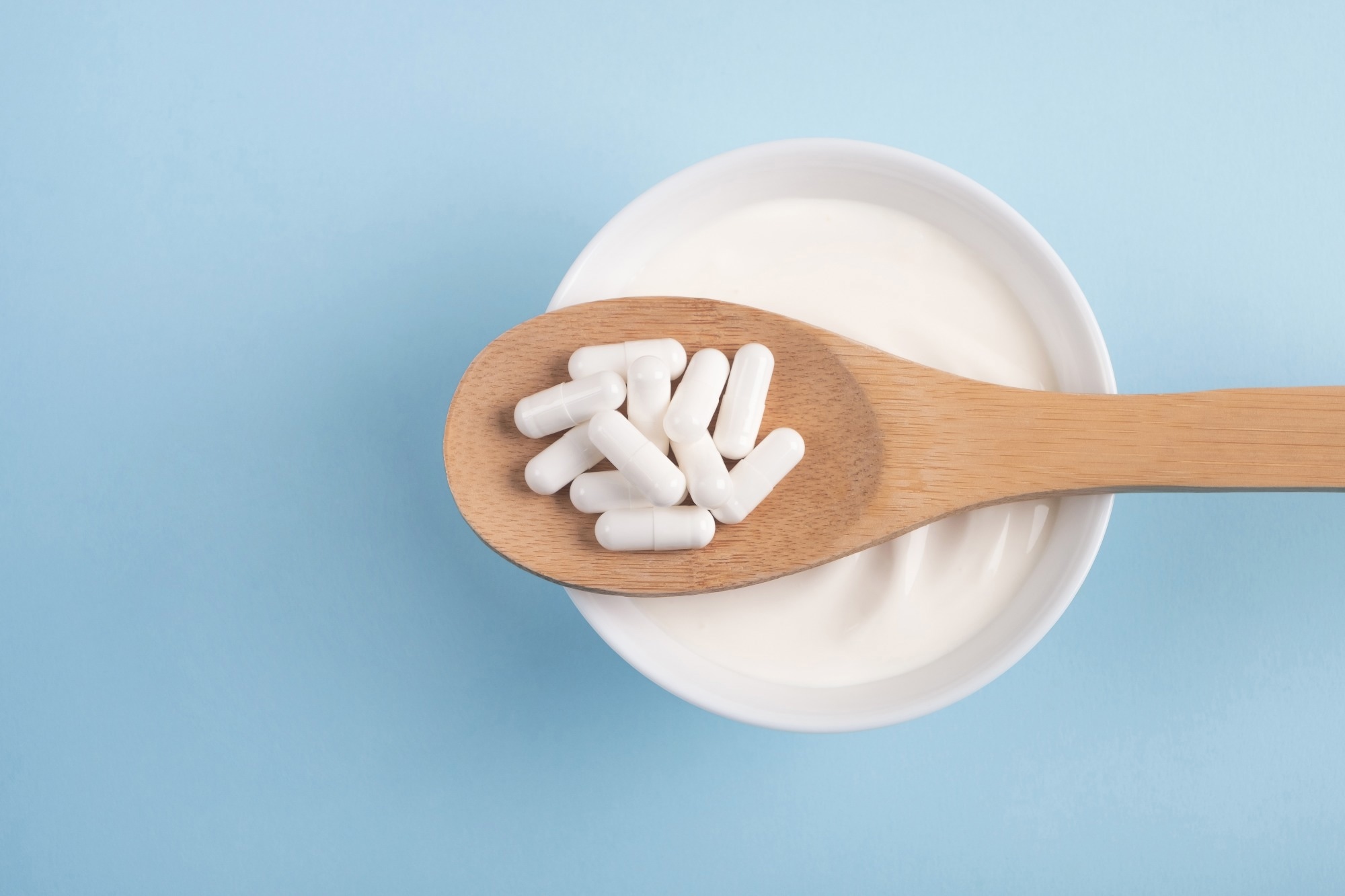Probiotics and immune modulation
Gut-lung axis and COVID-19
References
Further Reading
Probiotics are live microorganisms that provide beneficial physiological effects if consumed in proper quantities. Studies reported that some COVID-19 patients suffered from intestinal microbial dysbiosis characterized by low Bifidobacterium and Lactobacillus probiotics levels.
Giving probiotic supplementation to these patients helped re-normalize the intestinal microbiota balance and decrease the secondary infection risk due to the translocation of the bacteria.
 Image Credit: Helena Nechaeva/Shutterstock.com
Image Credit: Helena Nechaeva/Shutterstock.com
Probiotics and immune modulation
Probiotics are live microorganisms that confer a health benefit to the host if taken in adequate quantities. Fermented foods such as pickles, cheese, and yogurt contain lactic acid bacteria, which confer a beneficial physiological effect in humans. These fermented foods are classified as probiotics, and they are generally safe.
It is recommended that 108 to 1010 CFU of probiotics be consumed daily to make the required health benefits in humans. The approved health benefits include maintaining intestinal pH, boosting the immune, preventing the initiation of allergic diseases, enhancing digestion of lactose, inhibiting or treating ischemic heart syndromes, enhancing dietary calcium bioavailability, vitamin B synthesis, and lowering blood cholesterol levels.
Many studies reported they also have antimicrobial effects against many spoilage and pathogenic bacteria. Some probiotic strains have direct and indirect anti-viral activities.
Probiotics boost immunity and prevent the initiation of allergic diseases. They also improve the bioavailability of nutrients, module immune cells, and regulate the bacterial ecosystem. Dendritic cells have an important role in immune homeostasis in the healthy intestines.
Deletion of T cells or stimulation of regulatory T cells can occur in the immature state of dendritic cells. The gut microbiota can drive dendritic cells to prime T cells. Lactobacillus casei and Lactobacillus reuteri help in the stimulation of IFN-gamma production and activation of pro-inflammatory Th1 cells.
Oral administration of Bifidobacterium infantis leads to stimulation of dendritic cells in mice, which can suppress Th2-biased responses and enhance Th1 pro-inflammatory effects, resulting in virus clearance.
Probiotics Lactobacillus delbrueckii ssp. bulgaricus, Lactobacillus acidophilus strains Lactobacillus gasseri, Bifidobacterium bifidum stimulate IFN-alpha synthesis by monocytes. Lactobacillus probiotic strains could stimulate dendritic cells to secrete IL-12, which could stimulate NK cells to secrete IFN-gamma, an important cytokine for lung bacterial (Staphylococcus aureus) and viral clearance.
Probiotics such as Lactobacillus casei can also interact with Toll-like receptors on the epithelial cells, stimulating the synthesis of cytokines that have an important role in improving the productivity of epithelial cells and inhibiting their apoptosis which stimulates the proliferation and survival during restoration.
Probiotics - What Are Probiotics - Health Benefits Of Probiotics - Foods With Probiotics
Gut-lung axis and COVID-19
The lung and gut are among the body parts that host microbiota; however, the gut has a higher level of microbiota than the lung. Recent studies reported that bidirectional communication between the gut and lung exists, commonly called the gut-lung axis. This bidirectional communication has a role in immune homeostasis support.
There is evidence that the gastrointestinal tract's inflammation leads to lung inflammation via this gut-lung axis. Although the exact mechanism of the gut-lung axis is still largely unknown, dysbiosis of gut and lung microbiota is considered one of the main factors.
Previous studies reported that gut microbiota dysbiosis is linked with several respiratory disorders, and the lung microbiota composition shifts toward the gut microbiota have been reported in different respiratory pathological conditions.
The bidirectional communication between gut and lung microbiota systems could be due to the increased permeability of the gastrointestinal tract, which permits the leakage and migration of the gut microbiota to the lung, which could modulate its microbiota and, ultimately, its immune reaction. Lipopolysaccharides and short-chain fatty acids, which are gut microbial components and metabolites, respectively, play a role in this gut-lung bidirectional communications.
Cough, fever, breath shortness, and severe respiratory syndromes are the major symptoms of COVID-19 infection. Still, recent studies reported that COVID-19 patients also have gastrointestinal symptoms such as bleeding, nausea, abdominal pain, diarrhea, vomiting, and loss of appetite.
Zuo et al. reported that fecal samples with signature of low-to-none SARS-CoV-2 infectivity are marked with higher abundances of short-chain fatty acid-producing bacteria, Alistipes onderdonkii, Parabacteroides merdae, Bacteroides stercoris, and Lachnospiraceae bacterium 1_1_57FAA.
Ren and colleagues found a low level of butyric acid-producing bacteria and a high level of lipopolysaccharide-producing bacteria in COVID-19 patients in the oral cavity. The effect of probiotics against COVID-19 should be assessed as soon as possible to understand better the bacterial dynamics in the gastrointestinal tract and lung axis.
References
- Dargahi, Narges, et al. "Immunomodulatory effects of probiotics: Can they be used to treat allergies and autoimmune diseases?." Maturitas 119 (2019): 25-38.
- de Roock, Sytze, et al. "Gut derived lactic acid bacteria induce strain specific CD4+ T cell responses in human PBMC." Clinical Nutrition 30.6 (2011): 845-851.
- Hufnagl, Karin, et al. "Dysbiosis of the gut and lung microbiome has a role in asthma." Seminars in immunopathology. Vol. 42. No. 1. Springer Berlin Heidelberg, 2020.
- Olaimat, Amin N., et al. "The potential application of probiotics and prebiotics for the prevention and treatment of COVID-19." npj Science of Food 4.1 (2020): 1-7.
- Ren, Zhigang, et al. "Alterations in the human oral and gut microbiomes and lipidomics in COVID-19." Gut 70.7 (2021): 1253-1265.
- Zafar, Nishat, et al. "Probiotics: Helpful for the prevention of COVID-19?." Biomedical Research and Therapy 7.11 (2020): 4086-4099.
- Zuo, Tao, et al. "Depicting SARS-CoV-2 faecal viral activity in association with gut microbiota composition in patients with COVID-19." Gut 70.2 (2021): 276-284.
Further Reading
Last Updated: Oct 3, 2023